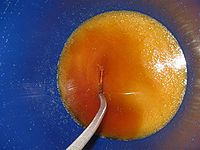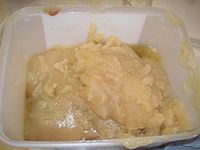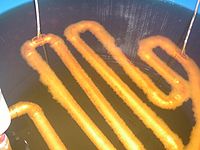Difference between revisions of "Winter waxing"
m (Reworded) |
m |
||
| Line 1: | Line 1: | ||
| − | High Melt Point Esters are [[Fatty Acid Methyl Esters]] with | + | High Melt Point Esters are [[Fatty Acid Methyl Esters]] with melt points above ambient - typically between 10°C to 40°C. |
| − | + | HMPEs are usually seen in winter as either suspended flakes in the biodiesel, or white/yellow cream at the bottom of drums. Adding petrol to a warm, melted mix does not prevent the HMPEs re-solidifying on cooling. | |
| − | The | + | Treatment is by filtering out the solids at the ambient temperature the fuel will be used at, or [[Water Washing]] with cold water. The initial level of HMPEs in the produced fuel may also be reduced by doing a cold [[Water Prewash]]. |
| − | The | + | The presence of HMPEs in biodiesel is thought to be mostly feedstock related, with processing method playing only a minor part. There is some speculation that the [[Whole Batch Demeth]] processing method may produce more HMPEs than traditional methods (possibly because the yeild is higher using this technique), although this is unconfirmed. |
<gallery caption="High Melt Point Esters" widths="200px" heights="200px" perrow="3"> | <gallery caption="High Melt Point Esters" widths="200px" heights="200px" perrow="3"> | ||
Revision as of 09:21, 24 November 2010
High Melt Point Esters are Fatty Acid Methyl Esters with melt points above ambient - typically between 10°C to 40°C.
HMPEs are usually seen in winter as either suspended flakes in the biodiesel, or white/yellow cream at the bottom of drums. Adding petrol to a warm, melted mix does not prevent the HMPEs re-solidifying on cooling.
Treatment is by filtering out the solids at the ambient temperature the fuel will be used at, or Water Washing with cold water. The initial level of HMPEs in the produced fuel may also be reduced by doing a cold Water Prewash.
The presence of HMPEs in biodiesel is thought to be mostly feedstock related, with processing method playing only a minor part. There is some speculation that the Whole Batch Demeth processing method may produce more HMPEs than traditional methods (possibly because the yeild is higher using this technique), although this is unconfirmed.
- High Melt Point Esters





